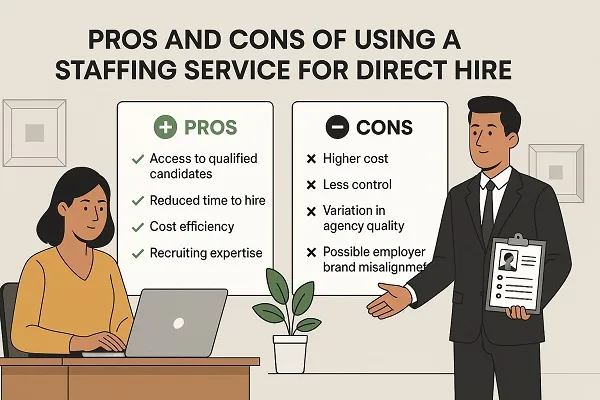Using a staffing service for direct hire is a strategy many employers consider when they need strong talent without wasting time, money or resources on ineffective recruiting. This approach can streamline hiring and give companies access to qualified professionals who match their long term needs. Yet it also comes with considerations that organizations should evaluate before partnering with an agency.
Below is a detailed, SEO friendly breakdown of the advantages and disadvantages of using a staffing service for direct hire, written to help employers make an informed decision.
Why Companies Turn to Staffing Services for Direct Hire
Many businesses explore direct hire staffing services because they want reliable recruiting support that reduces hiring risks. These services are often used to fill roles requiring specialized skills or long term commitment. A staffing agency can also help companies avoid lengthy internal searches that drain productivity.
Key reasons employers consider this approach include:
- Faster access to experienced candidates
- Reduced internal workload
- Better placement accuracy
- Stronger passive candidate pipelines
Advantages of Using a Staffing Service for Direct Hire

Access to Highly Qualified Candidates
Staffing agencies maintain active networks of professionals who might not apply through traditional channels. Many are passive candidates who are employed but open to the right opportunity. This gives employers access to stronger talent pools than they might reach on their own.
Agencies also pre screen candidates, review work history and evaluate skill sets. This helps employers focus only on the most relevant individuals instead of sifting through hundreds of resumes.
Reduced Time to Hire
A direct hire staffing service can significantly shorten the hiring timeline. Since agencies already maintain candidate pipelines, they can deliver matched talent quickly. This is especially valuable when:
- A role must be filled urgently
- The position requires niche technical expertise
- Internal teams lack recruiting bandwidth
Faster hiring improves productivity and prevents burnout for existing employees who might be covering vacancies.
Cost Efficiency and Reduced Risk
While there is a fee involved, many organizations view staffing services as a cost effective solution. Agencies help minimize hiring mistakes, which can be expensive and disruptive.
Cost savings often come from:
- Fewer bad hires
- Reduced advertising expenses
- Less internal time spent on screening
- Lower turnover due to better candidate matching
By ensuring candidates are fully evaluated before placement, agencies help employers avoid costly misalignment.
Professional Recruiting Expertise
Direct hire staffing agencies specialize in evaluating talent and understanding market trends. Their recruiters know how to identify red flags, interpret career paths and assess cultural fit.
This expertise benefits employers that:
- Lack a full scale HR department
- Need support identifying high level or specialized roles
- Want competitive insights on salary expectations or hiring trends
Potential Drawbacks of Using a Staffing Service for Direct Hire

Higher Upfront Cost
Direct hire fees are typically charged as a percentage of a candidate’s annual salary. While many companies view this as a worthwhile investment, the upfront expense can be a concern for smaller organizations or businesses with tight budgets.
Common cost challenges include:
- Higher fees for hard to fill or senior roles
- Limited flexibility if budgets fluctuate
- Difficulty justifying fees for high volume hiring
Less Direct Control Over the Early Hiring Stages
Since the staffing agency handles the initial sourcing and screening, employers have less visibility early in the process. Some businesses prefer to manage every step of evaluation themselves, especially if they have unique hiring preferences.
Concerns may include:
- Candidate communication style
- How screening evaluations are conducted
- Whether cultural fit is assessed to internal standards
Clear communication with the agency can minimize these issues but cannot eliminate them completely.
Variation in Agency Quality
Not all staffing services offer the same level of expertise. Working with an inexperienced or poorly aligned agency can lead to:
- Low quality candidates
- Missed hiring deadlines
- Miscommunication during the recruiting process
Selecting the right partner is crucial. Companies should review an agency’s industry specialization, success rate and recruitment process before engaging.
Possible Misalignment With Employer Brand
Staffing agencies represent employers to candidates, which means their communication influences how talent perceives the company. If messaging is inconsistent or unclear, it can affect candidate expectations.
Potential issues include:
- Misrepresentation of role responsibilities
- Inaccurate communication about workplace culture
- Overpromotion of benefits or growth opportunities
Employers can prevent this by providing the agency with clear, detailed job information and ongoing feedback.
How to Maximize the Benefits of a Direct Hire Staffing Service

Choose a Partner That Specializes in Your Industry
Industry expertise improves placement quality. A specialized agency understands job requirements, compensation benchmarks and candidate motivations better than a generalist firm.
Maintain Open Communication
Consistent communication helps:
- Ensure accurate candidate matching
- Clarify expectations
- Speed up decision making
- Keep the recruiting process aligned with internal priorities
Agencies value employer feedback, and the hiring process becomes smoother when both sides collaborate.
Share Clear Job Requirements and Company Values
The more an agency understands the role and the organization, the better they can represent your brand. Provide insights about:
- Required technical skills
- Soft skills essential for success
- Team environment and leadership style
- Long term opportunities
Evaluate Agency Performance Regularly
Employers should monitor metrics such as:
- Quality of candidates submitted
- Time to fill
- Candidate retention
- Accuracy of cultural fit
This helps ensure the partnership continues to deliver value.
Key Questions to Ask Before Choosing a Staffing Service

Some essential questions include:
- What is your experience with direct hire in our industry
- What is your average time to fill for similar roles
- How do you screen candidates for long term fit
- What does your recruitment process include
- What happens if a hire does not work out
These questions help clarify expectations and ensure a strong partnership.
When weighing the pros and cons of using a staffing service for direct hire, it becomes clear that the approach can strengthen hiring results when executed with the right partner. Employers gain access to top talent, reduce hiring delays and benefit from expert recruiting support. At the same time, it is important to be mindful of costs, agency quality and the need for ongoing communication. By evaluating these factors thoughtfully, organizations can determine whether this approach aligns with their staffing strategy and long term goals.
Content reviewed and published by Tier2Tek Staffing Editorial Team .

